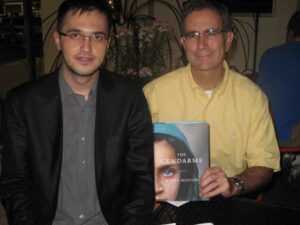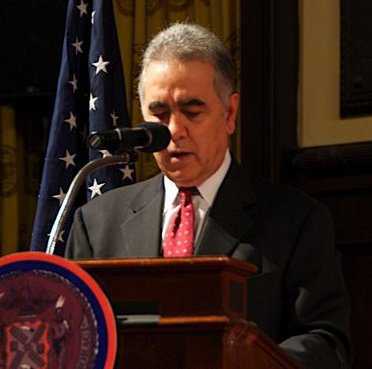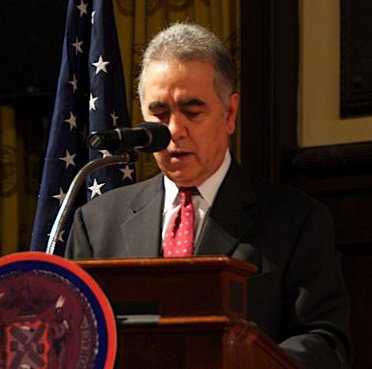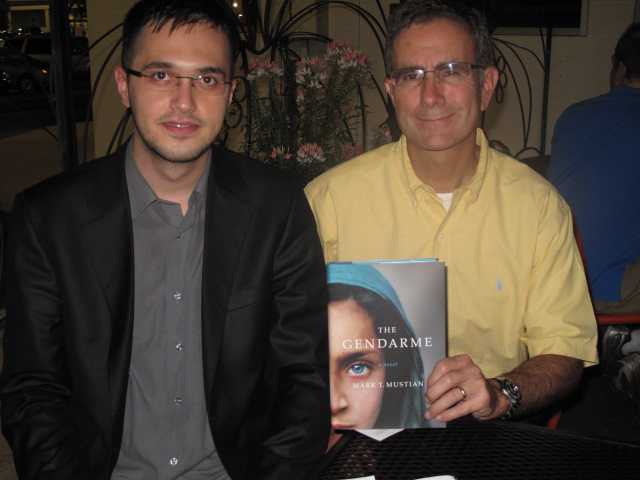 Turkey, which was made aware of the sensitivity surrounding the Armenian issue throughout the world through attacks by the Armenian Secret Army for the Liberation of Armenia (ASALA), continues to be caught unprepared every year as to how to shape its approach towards the events of April 24. (more…)
Turkey, which was made aware of the sensitivity surrounding the Armenian issue throughout the world through attacks by the Armenian Secret Army for the Liberation of Armenia (ASALA), continues to be caught unprepared every year as to how to shape its approach towards the events of April 24. (more…)
Category: Authors
-

Mr. President, Armenian-Americans Reject Your Offensive Word Games on Genocide
By Harut Sassounian
Publisher, The California Courier

Despite Armenian-Americans’ persistent admonishment of Pres. Obama to refrain from substituting “Meds Yeghern” (Great Calamity) for the Armenian Genocide in his annual April 24 statement, he has continued to do so for three years in a row.
Apparently, henchmen of the denialist Turkish regime and their American cohorts have been able to compel the President of the United States to avoid any reference to the “genocide” or “tseghasbanoutyoun” — its Armenian equivalent. Otherwise, why would the President of the United States address the American public in a foreign language known only to a few? Armenian substitute words such as “Meds Yeghern” are simply meant to fool some gullible Armenian-Americans. This is a cheap trick that is beneath the dignity of the Presidency!
Over the past three years, rather than mending his ways and discontinuing the use of “Meds Yeghern,” Pres. Obama has done the exact opposite. Incredibly, he is using that term in this year’s April 24 statement not once, not twice, but three times! The President shamefully continues the silly and offensive word games of his predecessors — whom he had severely criticized — reducing genocide to “horrific events,” “atrocities,” “massacres,” and “devastating events.”
Earlier this month, Pres. Obama declared his candidacy for reelection and asked Americans to reelect him for another four more years. In my view, anyone who so blatantly breaks his promises on both Armenian and non-Armenian issues, including acknowledgment of the genocide, does not deserve to be reelected. It is hard to imagine that any self-respecting Armenian would vote for him again.
To show how offended they are by Pres. Obama’s broken promises, over a thousand Armenian-Americans held a spirited protest at Sony Studios in Culver City, at the site of his major fundraiser on the eve of April 24. Their anguished message was carried far and wide by the assembled local, national and international media. Just about every news outlet highlighted the protesters’ mistrust of Pres. Obama, casting a shadow on the celebratory atmosphere of his reelection campaign.
Helping to amplify the protesters’ message was vocalist Serj Tankian of the System of a Down whose presence and fiery remarks electrified the crowd, attracting considerable media attention.
Another major boost for the demonstration came from TV celebrity Kim Kardashian who sent a twitter message to her 7.2 million fans around the world, along with a link to her blog: “Today, thousands of Armenians will come together in Los Angeles to protest against the denial of the genocide and urge the United States government to recognize the Armenian Genocide. I hope that I can bring some attention to this today.”
During my recent appearances on ABC-TV and FOX-TV, I explained that the purpose of the protest was not to beg Pres. Obama to use the word genocide. It was rather to let him and other politicians know that Armenian-Americans would no longer remain silent when an elected official makes lavish campaign promises to get their votes and money, only to ignore them after the election. These officials should be made to pay a political price for their hypocrisy. To make democracy work, citizens should ensure that dishonest politicians are not reelected. It is bad enough to be fooled once; but allowing ourselves to be fooled twice is truly unforgivable!
Using the Culver City rally as a precedent, Armenian-Americans throughout the United States should hold protests at every campaign appearance of Pres. Obama in the next 18 months!
Furthermore, Armenians do not really need Pres. Obama to repeat what Pres. Reagan stated 30 years ago by referring to the Armenian Genocide in his Presidential Proclamation of April 22, 1981. By breaking his campaign pledge, Pres. Obama compromises his moral and political standing as the leader of the free world!
Let us not forget two other major culprits in this deplorable affair! Where is Vice President Joe Biden hiding these days? Does he recall that he delivered dozens of strongly-worded speeches on the Armenian Genocide during his long years in the Senate and as presidential candidate? What about Hillary Clinton? How quickly did she transform herself from a champion of genocide recognition as Senator and presidential candidate, into a Secretary of State who hides from the media while placing a “personal” wreath at the Genocide Monument in Yerevan, and lobbies Congressmen to vote against a genocide resolution?
The 2012 elections present an ideal opportunity to settle scores with all those who have betrayed the trust of the Armenian-American community.
-

Serj Tankian to Join L.A. Armenians To Protest Against Obama on April 21

Armenian-Americans are offended that Pres. Obama is going to launch his reelection campaign in Los Angeles this week, on the eve of April 24, having failed to honor his solemn promise to acknowledge the Armenian Genocide.A special Task Force has been set up to organize a communitywide protest to remind the President of his many unkept promises. All major Armenian-American organizations have been activated. Press releases have been written, the airwaves flooded with interviews and ads regarding the demonstration, thousands of flyers printed and distributed, protest signs and banners prepared, and buses chartered to transport the public to the site of the President’s fundraiser on April 21.The news of the planned Armenian protest must not have been well received by the White House. Neither the President nor his staff would want to come to a major city to launch his reelection campaign, in the face of disenchanted voters who question his credibility in front of TV cameras.Until this week, White House officials had paid little attention to a March 28 letter from ANCA chairman Ken Hachikian, inviting the President or a Cabinet member to participate in the annual commemoration by laying a wreath at the Armenian Genocide Monument in Montebello, California, on April 24. Given the prospect of a major protest rally on the occasion of the President’s visit on April 21, Democratic officials asked ANCA Western Region to send a follow-up letter, inviting the President to stop by the Genocide Monument in Montebello, situated minutes away from his appearance in Culver City.It is highly unlikely that the President would make such a gesture to respect the memory of genocide victims on April 21, particularly since three days later he will be issuing a statement on the 96th anniversary of the Armenian Genocide, in which once again he will shy away from using the word genocide.The dangled carrot of a presidential visit to Montebello should not deter the Armenian community’s resolve from showing up in large numbers outside the President’s fundraiser in Culver City. In fact, whatever interest the White House may be showing regarding the Armenian community at this time might well be due to the planned protest.It is not realistic to expect that the President will acknowledge the Armenian Genocide in the next two years, nor do so if reelected for a second term. Under these circumstances, rather than begging him to use those two “forbidden” words, at every campaign stop Armenian-Americans should raise serious questions about Pres. Obama’s credibility and suitability to lead the nation for another four years. Should Armenian-Americans continue to remain silent, they would be encouraging all other elected officials to deceive the community with empty promises.The Armenian Genocide Community Task Force, the organizing body of the April 21 rally, has issued an urgent call to action, asking Los Angeles Armenians to participate in large numbers in order to let Pres. Obama hear the community’s “profound disappointment at his failure to honor his campaign promise” and “deliver justice to the Armenian people.” In its announcement, the Task Force pointed out that a large turnout would not only send a loud and clear message to the White House, but also publicize Armenian political demands among millions of people around the world who would be watching the presidential visit on national and international television.It is salutary that prominent Armenian-American musician Serj Tankian will be participating in the April 21 protest. Moreover, Tankian posted a message to his 570,000 facebook fans, urging them to support the protest: “On Thursday, April 21 at 3 p.m., everyone in Southern California is urged to join in a public protest urging President Obama to uphold his promise and recognize the Armenian Genocide. This issue has always been of extreme importance to Serj and his family.”Special arrangements have been made to provide transportation to the public by buses starting at 1:30 p.m. from St. Mary’s Church in Glendale, Rose & Alex Pilibos School in Hollywood, and Ferrahian High School in Encino. Those planning to drive to the rally should arrive around 3 p.m., at Sony Studios, 10202 W. Washington Boulevard in Culver City, California.The larger the number of participants, the more visible their presence and the more audible their voices will be at the rally. -

Armenians Should Confront Pres. Obama During his California Visit Next Week
 It is a shame that the largest Armenian community in the Diaspora has failed to take advantage of Pres. Obama’s visits to California to protest his refusal to acknowledge the Armenian Genocide. Last October, when he traveled to Los Angeles and Glendale, not a single Armenian confronted him at his public appearances.To make up for their negligence, Armenians in California have a golden opportunity to show that they are deeply troubled when the highest official of the land does not keep his pledge on the Armenian Genocide.Pres. Obama will be in San Francisco on April 20 and in Los Angeles on April 21 – three days before the 96th anniversary of the Armenian Genocide – to launch his reelection campaign with major fundraisers publicized as “Obama Victory Fund 2012.”During the next 18 months, Armenian-Americans should hold demonstrations at every one of the President’s campaign stops throughout the country until the November 2012 presidential election. This is an opportune moment to highlight the President’s lack of credibility, at a time when he is most vulnerable due to his low ratings, as he launches his reelection campaign.Armenians do not need to beg the President to utter the words Armenian Genocide. A more popular head of state – Pres. Ronald Reagan – used those words on April 22, 1981, almost 30 years to the day of Pres. Obama’s visit to Los Angeles! The only reason to protest Obama’s visit would be to let him know that Armenians will no longer be duped when politicians make false campaign promises to gain their support, and ignore them after the election! The Armenian slogan for the 2012 presidential election should be: “Not one vote and not one penny for Obama!”Here is the list of Pres. Obama’s multiple sins on Armenian issues:
It is a shame that the largest Armenian community in the Diaspora has failed to take advantage of Pres. Obama’s visits to California to protest his refusal to acknowledge the Armenian Genocide. Last October, when he traveled to Los Angeles and Glendale, not a single Armenian confronted him at his public appearances.To make up for their negligence, Armenians in California have a golden opportunity to show that they are deeply troubled when the highest official of the land does not keep his pledge on the Armenian Genocide.Pres. Obama will be in San Francisco on April 20 and in Los Angeles on April 21 – three days before the 96th anniversary of the Armenian Genocide – to launch his reelection campaign with major fundraisers publicized as “Obama Victory Fund 2012.”During the next 18 months, Armenian-Americans should hold demonstrations at every one of the President’s campaign stops throughout the country until the November 2012 presidential election. This is an opportune moment to highlight the President’s lack of credibility, at a time when he is most vulnerable due to his low ratings, as he launches his reelection campaign.Armenians do not need to beg the President to utter the words Armenian Genocide. A more popular head of state – Pres. Ronald Reagan – used those words on April 22, 1981, almost 30 years to the day of Pres. Obama’s visit to Los Angeles! The only reason to protest Obama’s visit would be to let him know that Armenians will no longer be duped when politicians make false campaign promises to gain their support, and ignore them after the election! The Armenian slogan for the 2012 presidential election should be: “Not one vote and not one penny for Obama!”Here is the list of Pres. Obama’s multiple sins on Armenian issues:1. He repeatedly pledged to acknowledge the Armenian Genocide during the 2008 presidential campaign and did not keep his word after the election.
2. To make matters worse, his administration actively opposed the adoption of the 2010 congressional resolution on the Armenian Genocide.
3. He significantly cut the amount of foreign aid given to Armenia and Artsakh (Karabagh), contrary to his campaign promise. Moreover, his administration did not spend the full amount of aid Congress allocated to Artsakh.
4. He pressured Armenia in 2009 to sign the infamous “Protocols” with Turkey.
5. He made no attempts to press Turkey into lifting its blockade of Armenia.
6. He remained silent in the face of repeated saber-rattling by Azerbaijan’s President against Armenia and Artsakh, ignoring his campaign pledge to support Artsakh’s self-determination.
7. He and Secretary of State Hillary Clinton did not respond to repeated requests to meet with Armenian-American community leaders to hear their concerns.
8. Last Christmas, while the Senate was in recess, he circumvented the “hold” placed by U.S. Senators, and appointed Matt Bryza as Ambassador to Azerbaijan.
It is crucial that a large number of Armenian-Americans show up on April 20 and 21, not only to protest against the President, but also to publicize their demands through the media covering Pres. Obama’s visit. Should Armenians remain silent, they would be sending the wrong message to politicians that making empty promises to Armenians to get their money and votes, and ignoring them after the election would have no negative consequences to their political careers!Armenians need to wake up from their lethargy. If they want elected officials to take them seriously, they must reward those who support their issues by helping to reelect them, and punish those who make false promises by working to defeat them.A few days after his visit to California, Pres. Obama will issue his annual April 24 statement which will probably exclude once again the term Armenian Genocide. Armenian protesters must make it clear to the President that playing word games with genocide is offensive and that he will pay a political price for his unwillingness to tell the truth!Pres. Obama will be in San Francisco on April 20, at 5 p.m., at the Nob Hill Masonic Center, 1111 California Street, and in Culver City on April 21, at 4:30 p.m., at the Sony Studios, 10202 W. Washington Blvd. Thousands of Armenians should show up at these two locations to protest Pres. Obama’s record of broken promises!As a former Obama supporter, I will be standing outside the Sony Studios on April 21 to express my profound disappointment in his handling of Armenian issues and to let him know that Armenian-Americans will not support his reelection. -

Yoğurt “Yogurt”
The word is derived from Turkish yoğurt, and is related to yoğurmak ‘to knead’ and yoğun “dense” or “thick”.
 There is evidence of precultured milk products being produced as food for at least 4,500 years. The earliest yoghurts were probably spontaneously fermented by wild bacteria.The oldest writings mentioning yogurt are attributed to Pliny the Elder, who remarked that certain nomadic tribes knew how “to thicken the milk into a substance with an agreeable acidity”. The use of yoghurt by medieval Turks is recorded in the books Diwan Lughat al-Turk by Mahmud Kashgari and Kutadgu Bilig by Yusuf Has Hajib written in the 11th century. Both texts mention the word “yoghurt” in different sections and describe its use by nomadic Turks.
There is evidence of precultured milk products being produced as food for at least 4,500 years. The earliest yoghurts were probably spontaneously fermented by wild bacteria.The oldest writings mentioning yogurt are attributed to Pliny the Elder, who remarked that certain nomadic tribes knew how “to thicken the milk into a substance with an agreeable acidity”. The use of yoghurt by medieval Turks is recorded in the books Diwan Lughat al-Turk by Mahmud Kashgari and Kutadgu Bilig by Yusuf Has Hajib written in the 11th century. Both texts mention the word “yoghurt” in different sections and describe its use by nomadic Turks. -

Cemal Pasha’s Grandson Says Genocide,
Morgenthau’s Great Granddaughter doesn’t

By Harut Sassounian
Publisher, The California Courier
Hundreds of Armenians turned out at UCLA last Thursday night to hear with great apprehension Hasan Cemal, the grandson of Cemal Pasha — one of the top three Turkish butchers of the Armenian nation. This unique and controversial event, titled “From Der Zor to Dzidzernagapert: A Conversation with Hasan Cemal,” was organized by AGBU Asbeds.
Understandably, there was great tension in the air. The large hall was filled to capacity and many were turned away due to lack of room. The presence of armed policemen and security guards inside the hall was both reassuring and disturbing. Cemal confirmed that he was cautioned against coming to Los Angeles, but fortunately everything proceeded calmly. The most shocking thing that evening was not what Cemal said, but what another speaker, Dr. Pamela Steiner, the great granddaughter of Amb. Henry Morgenthau, did not say!
Kurken Berksanlar, Chairman of ABGU Asbeds, welcomed everyone to “an open-minded conversation.” While admitting that some Armenians view with great suspicion Turks who acknowledge the Genocide, he believed that “progressive” Turks, who are speaking openly about the evens of 1915…, appear to be above and beyond the reach and control of today’s Turkish government.” Berksanlar then introduced the keynote speaker Hasan Cemal and the two discussants, Dr. Pamela Steiner, and Prof. Richard Hovannisian.
A columnist at Milliyet newspaper, Cemal immediately won over his skeptical audience by greeting them in Armenian — “parev harkeli paregamner” — and telling them: “I came here to open my heart and open my mind to you…. I know your pain, your grief of Genocide, your grief of Meds Yeghern.” Ignoring Article 301 of the Turkish Penal Code which bans the use of the term Armenian Genocide, he courageously repeated those words several more times during his talk. He also condemned the Turkish government’s denial of the Armenian Genocide, calling it “colluding in the crime!”
Cemal described his deeply moving 2008 visit to the Armenian Genocide Monument in Yerevan, where he laid three carnations in memory of his close friend, Hrant Dink, the Armenian journalist who was assassinated in Istanbul by Turkish extremists. While visiting Yerevan, he had a startling encounter with Armen Gevorkyan, grandson of the man who in 1922 assassinated his grandfather, Cemal Pasha.
Cemal described the progress made in Turkey during the past three decades on the recognition of the Armenian Genocide, going from total denialism to an apology campaign, restoration of Armenian churches, and holding academic conferences on this topic. He asked Armenians to come to Turkey to participate in the “recovery of memory.” He urged them never to forget the past, without becoming its captives.
While Cemal’s candid remarks left a good impression on the audience, Dr. Steiner turned off the attendees with her adamant and intentional refusal to use the word genocide. Instead, she used such typical Turkish denialist terminology as “tragedy,” “suffering,” and “events of 1915.” As director of the Inter-Communal Trust-Building Project, she spoke about “possible steps towards building trust between Armenians and Turks.” She stunned the audience by asking Armenians to acknowledge that “the Turkish people [who] suffered horrendously during World War I … need and deserve acknowledgment for that!” As if that request was not outrageous enough, she went on to urge Armenians to “consider acknowledging Turkish suffering before they receive an acknowledgment for theirs!”
During the question and answer period, when I pointed out the irony of Cemal Pasha’s grandson freely using the term Armenian Genocide, while the great granddaughter of Amb. Morgenthau would not, Dr. Steiner’s response was inadequate. Her justification was that she was playing the role of a “facilitator,” seeking “conciliation” between Armenians and Turks.
The final discussant, Prof. Hovannisian, in a stern voice, gave a polite, yet powerful response to the previous speakers. He told Hasan Cemal that the large Armenian audience had come not to listen to him as a Turkish journalist, but as the grandson of Cemal Pasha. He explained that understanding the Turkish perpetrators’ mindset cannot in any way justify their actions. He cautioned everyone not to equate Armenian suffering resulting from intentional destruction with the suffering of Turks as a result of war. He emphasized that Armenians were seeking not only recognition, but, more importantly, restitution of their confiscated properties. He urged the Turkish government to return the hundreds of Armenian churches in Turkey to the Armenian Patriarchate of Istanbul. Finally, in a direct allusion to Dr. Steiner, Prof. Hovannisian emphasized that “conciliation” required “acts of contrition.” His remarks were greeted with a standing ovation.
I found Cemal to be both candid and brave. He could have easily avoided the use of the term Armenian Genocide, maintaining that doing so could land him in jail. However, he made no excuses and used the genocide term several times. Considering his grandfather responsible for “the Great Catastrophe,” he described today’s Turkey as “a manic-depressive country!”
Although it is not easy to forget that Hasan Cemal is the grandson of one of the three masterminds of the Armenian Genocide, it would be wrong to hold children responsible for the sins of their parents. His position has dramatically evolved since his Boston appearance two years ago, when he avoided the term Armenian Genocide. I asked him privately at the end of his UCLA talk if he was not concerned that he could be taken to court for using the word genocide. Even though he said he did not think so, he found it important enough to mention my concern in a column he wrote in Milliyet upon his return to Istanbul.
The only sour note in Cemal’s words that evening was his rejection of demands for the return of Armenian territories from Turkey. Nevertheless, it is not surprising to hear a Turk, no matter how tolerant, defend his country’s territorial integrity. He did state, however, that the Turkish government should apologize to Armenians and pay compensation to them.
On the other hand, Dr. Steiner, as a Jewish-American and direct descendant of Amb. Morgenthau, cannot be excused for her persistent refusal to use the term genocide, despite her self-avowed good intentions. Anyone who does not acknowledge the truth of the Armenian Genocide loses the moral authority to play a constructive role in Armenian-Turkish relations. One cannot remain neutral between a victim and victimizer. She should heed the wise words of Holocaust survivor and Nobel Laureate Elie Wiesel who stated: “Neutrality helps the oppressor, never the victim!”
As facilitator between the two communities, Dr. Steiner probably believes that she should not take sides. But telling the truth is not taking sides between Armenians and Turks, anymore than acknowledging the Holocaust is siding with Jews. Furthermore, it is not clear what exactly her role is as facilitator. Genocide is not a dispute that requires the services of a mediator. How can she reconcile two nations without the victimizer first making amends for what her own great grandfather called “The Murder of a Nation!”
Two days after her talk at UCLA, Dr. Steiner sent me a lengthy e-mail explaining further her role as facilitator and insisting that Amb. Morgenthau would have supported her work. I cannot pretend to know her great grandfather better than her, but being familiar with the Ambassador’s humanitarian efforts during and after the Genocide, I have no doubt that he would have done everything possible to bring justice to Armenians, rather than remaining neutral between the perpetrators and their victims.

